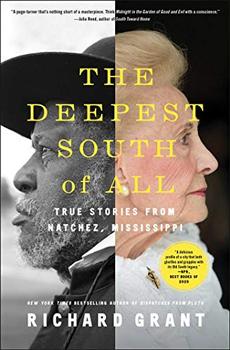Summary | Excerpt | Reviews | Beyond the Book | Readalikes | Genres & Themes | Author Bio

Critics' Opinion:
Readers' Opinion:
First Published:
Sep 2020, 288 pages
Paperback:
Aug 2021, 288 pages
 Book Reviewed by:
Book Reviewed by:
Jane McCormack
Buy This Book
She led me through another door, and I stepped back in time. Apart from the electric lightbulbs in the chandelier, Regina's magnificent dining room contained very little evidence that the twentieth century had occurred. An antique table was set with gorgeous antique china and glassware. The walls were green and hung with enormous prints of the birds that John James Audubon had shot and then painted during his time in Natchez in the 1820s. An odd contraption hung from the ceiling, a carved wooden board of some kind.
"That's a punkah," Regina explained. "It's a type of fan that came to Natchez from British India via the Caribbean. You see a lot of them in Natchez homes."
"In Natchez, you only use the word home if it's antebellum," said Doug. "If your house was built after the Civil War, it's trashy to call it a home."
In British India, a junior servant called a punkah wallah pulled the rope to keep the punkah fanning the air. Here, the task was performed by house slaves, then by former slaves and their descendants, until the advent of electric fans and air-conditioning turned punkahs into antique curiosities, kept around for nostalgia's sake, like so many things in Natchez.
"When I was growing up here, slavery was hardly ever mentioned," said Regina. "Or people would say that the slaves were happy and well looked after, and the Civil War was about states' rights and honor. You still hear that, of course, but we are finally making some progress. The best thing we can do about our awful history is to acknowledge it openly and honestly."
She invited me to look around the rest of the house while she dressed for the party. I had two surprises in quick succession. Almost literally, I bumped into Janet, a middle-aged black woman who worked for Regina as a cook and housekeeper and had helped raise her children. A few moments later, I was startled by a large oil painting of a young man wearing a Confederate officer's uniform with a saber at his waist. This was not some antique family heirloom, but recently painted. Regina seemed liberal and forward-thinking, so what was this hagiographic Confederate portrait doing on the wall of her front parlor?
"That's Miss Regina's son Jean-Luc," said Janet. "He was King of Pilgrimage a few years ago."
I asked her what that meant, and she told me to ask Miss Regina. When Regina emerged, wearing a long black dress, I questioned her about the painting. "Oh," she said, and gave a little laugh. "His brother Martin says he might as well have a swastika on his back, but Luc wanted to be King, which totally surprised us, and the tradition has always been that the men in the court wear these uniforms. I didn't even realize they were Confederate uniforms until quite recently, I'm embarrassed to admit. They were just the uniforms the guys always wore in the pageant."
Now I was even more puzzled. "What's the pageant?"
Regina said, "It's the Tableaux that the garden clubs put on every year. The children dance the Little Maypole, Big Maypole, the Soirée, and so on, and the Royal Court comes out with the King and Queen, but the whole thing is really about the social standing of the mothers. It's always so hard to explain."
Leaving for the party, I felt badly underdressed and completely baffled by all the unfamiliar terminology. As we drove through the quiet dark streets, Regina said the party was for the Pilgrimage Garden Club, of which she was president. "I'm amazed that you have time for gardening," I said, thinking about her cookbooks, her restaurant, her catering business, and the bed-and-breakfast.
"Oh." She gave another little laugh. "The garden clubs don't do any gardening, although we do appreciate flowers."
Doug said, "The garden clubs are about raising money, social prestige, tourism, and the historic preservation of antebellum buildings. They're run by women, and they have a lot of power. Natchez is probably the closest thing to a matriarchy that you're going to find in America."
Excerpted from The Deepest South of All by Richard Grant. Copyright © 2020 by Richard Grant. Excerpted by permission of Simon & Schuster. All rights reserved. No part of this excerpt may be reproduced or reprinted without permission in writing from the publisher.




From the moment I picked your book up...
Click Here to find out who said this, as well as discovering other famous literary quotes!
Your guide toexceptional books
BookBrowse seeks out and recommends the best in contemporary fiction and nonfiction—books that not only engage and entertain but also deepen our understanding of ourselves and the world around us.